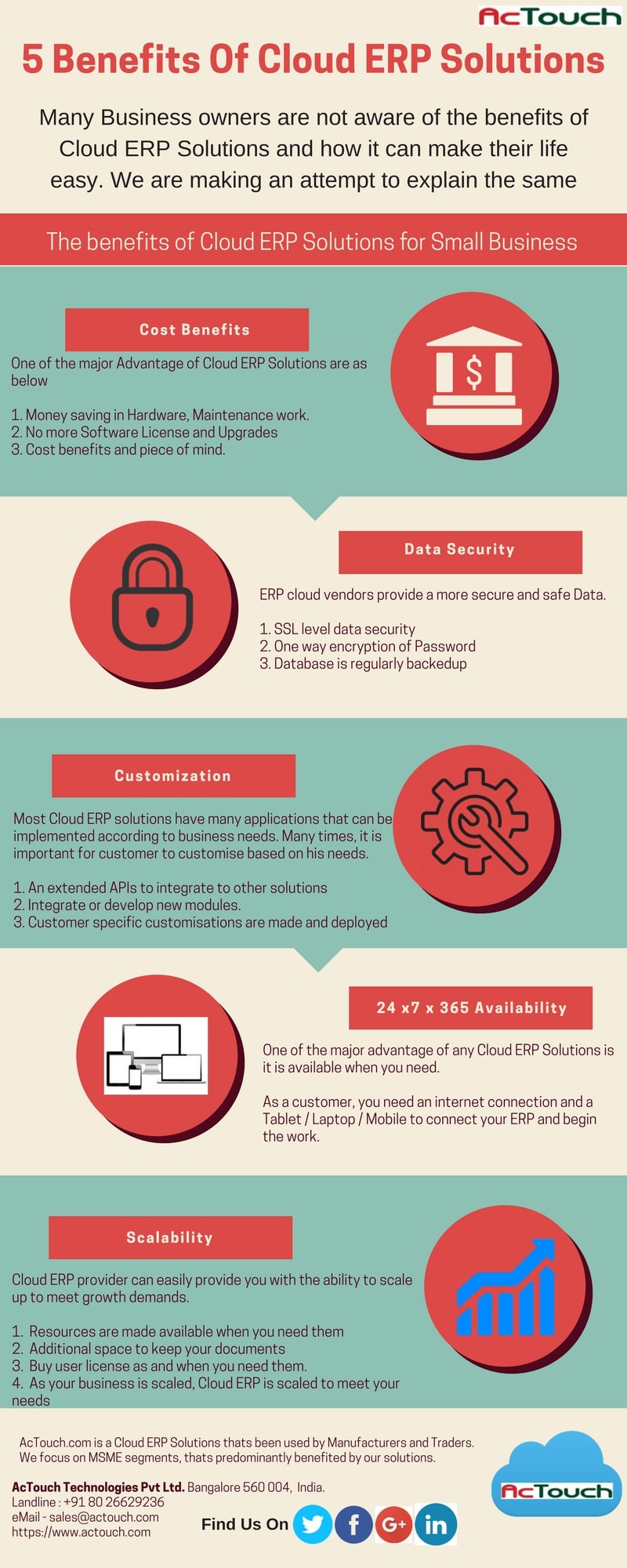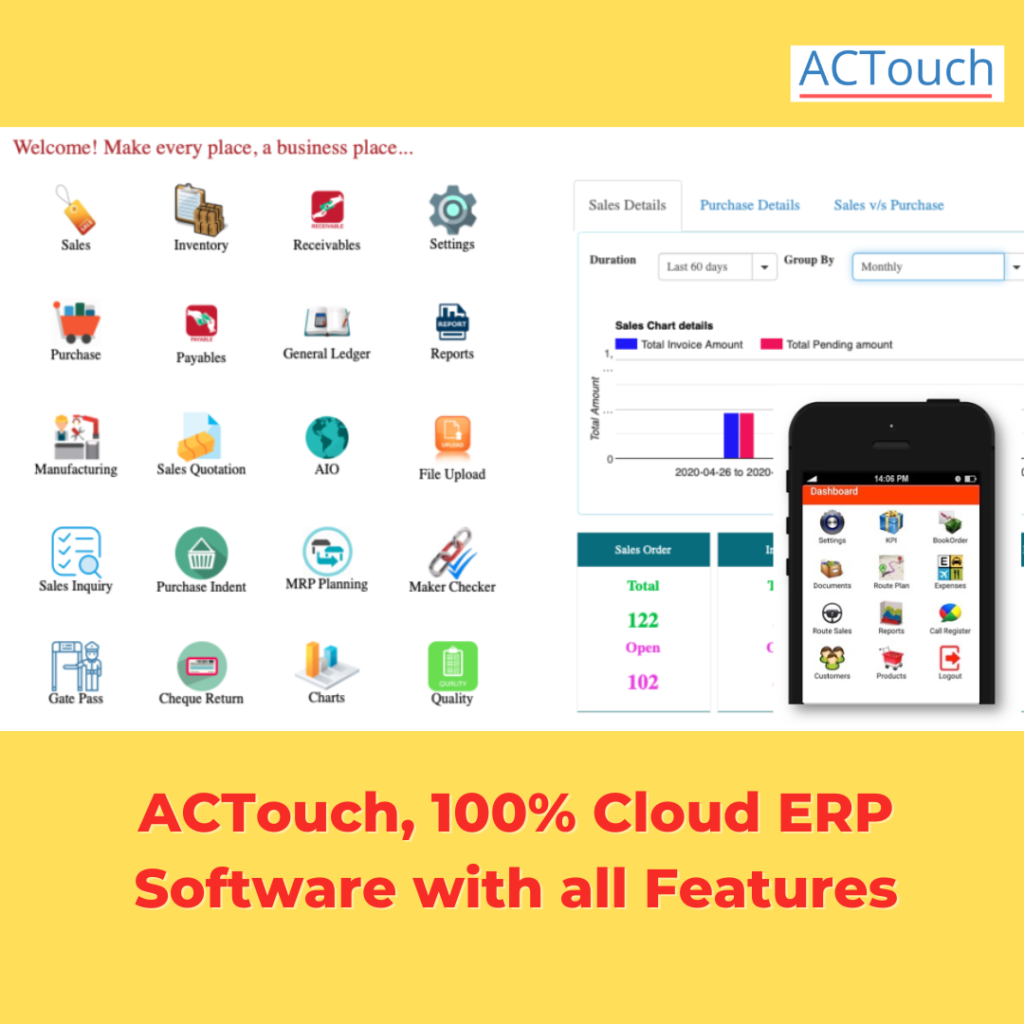Top Benefits of ERP Systems for SMB
Top Benefits of ERP Systems – ERP Systems could benefit many Business owners, Manufacturers, Book Keepers, CPA / Auditors etc. But they do not understand on why they should move into Cloud based ERP systems? We explained in details on the benefits of Cloud ERP Systems and how it would help them. Click here.
Enterprise Resource Planning has a competitive advantage with Cost Savings, regulatory compliance, improve core business processes with real time data presented in a better way and avoid the manual processes and repetitive tasks.
Enterprise resource planning systems with inventory management improves business operations and customer satisfaction. Cloud ERP helps to reduce the operational costs with an informed decisions process brought into business.
Few features needed for an ERP Systems are as below that gives a source of truth of stock, finance and transactions from disparate systems into one solutions like Customer relationship management, Payroll and Human resources, Supply chain management, Finance and compliance requirements with an integrated Business Tasks
Production schedules with Bills of materials helps to arrive at ABC model – Activity Based Costing that helps to add Inventory Costs, labor costs, operating costs and administrative costs /Overhead costs to semi-FG or Finished Goods costs.
Many Companies can transform their business Functions with ERP Systems.
Enterprise resource planning software offers advantages of Cost, Data Security, Customisation, Support, scalability and more. It helps to manage your business and improves the productivity of the people, your Distributors, Customers etc. It helps with Cost Savings, a better return on investment, maintain only needed inventory levels, improve communication between different sales teams with an accurate forecasts and sales plans.
A win-win for all.
10 Top Benefits of Cloud ERP Systems are as below.
-
Build a transparent Business system
Enterprise software helps across companies and easy to operate. Cloud ERP Systems helps to build a business environment that’s conducive for the business growth and success. - Data Security
Secured Data and its at one place to protect and store. If you use a Cloud ERP then, your data is secured on cloud and protected by hackers. -
Material Planning and Controls
Helps to control the materials consumption based on Procurement, tracking where they are consumed (in Production or on Maintenance side) etc. It also helps to maintain the -
Inventory Controls and ensure that wastage are reduced
Helps to manage Inventory stocks controls, find Finished Goods products costs, manage stocks at Software vendors / Subcontracting locations, helps to track Scrap and reject items etc. -
All business and their process are at one place
All business controls, process and transactions are at one place that’s integrated across each other modules. Availability of Data and transactions are centralised and accurate. Data collection models are standardised and data presentations are accurate with a standardised process. -
Improved business Competitiveness
Company management can get all the data from actual source that can be analysed and take decision. It could be Product Costing, Payment receipt timelines, Tax details etc. -
Business scalability and improved productivity
One of the biggest challenge in business is to have a right resources to manage the Business as its grows. But having lot of Human Resources will not help as the Business is growing fast. So we need a tool that has the ability to scale automatically and manage huge transactions. -
Happy Employees, Vendors and Customers
A rare case for business successes. If your employees could able to finish their production reporting or generate an Inventory report and send to their Boss etc on time then it gives time for them to handle additional responsibilities. This leads to all happy and it results in customer engagement and despatch too. A successful implementation of a software solutions will increase customer service with single source of truth and support. -
Key benefits of Real time reporting from a single platform and accurate data presentation – Follow 100% Compliance.
Interlinking of multi departments and data is “Pulled” from one department to another to work on. It helps increased the government compliances and ensures that taxes and details are accurate. This helps in reduced cost of compliances and follow the rules 100%. -
Increased operation efficiency with software implementation
No more knowledge centre and power struggle with in employees. One of the big problems in many manufacturing companies is, there are knowledge centres and these people do not want to share the details. So its advisable to ensure that these informations are passed to business process and stored safely in ERP. So your ERP should have an ability to transfer these data into process documents and controls.
Disadvantages of Cloud ERP Systems
As there are Benefits of ERP Systems, we can also list the disadvantages of an ERP Systems. Again these are general in nature and needn’t be same for all.
-
Large cost of ERP and its maintenance costs
There are ERPs that costs more than 4 to 5 times of regular Cloud ERPs. These are on-premise ERPs and the cost and maintenance is high. Please note its not just the regular ERP license and implementation cost, but also Human Resources costs, regular maintenance and emergency case of data recovery cases too.
-
High costs to deploy and implement it
Many ERPs like SAP, Oracle etc need multiple people who are each ERP Features specialist. These are good, when the business is too large. But for an SMB, where one user does many features, these large ERP, its cost of deployment becomes too much to handle.
-
Requires a regular training and enablement of team members
If a new person joins then we have to train him, even before he starts using the ERP. So the resource churn-out and training and retraining costs are high. When you have a complex ERP, fixing a process without any flexibility to change is not good. Be careful.
-
Even an ERP Systems implementation
ERP Implementation period is 3 to 4 months, but it takes 12 months for few customers to settle with it and ensure that they follow the process. So showing an ROI to the management takes time
-
Most of the ERP application implementation is rigid.
Many ERP Implementation is designed with a complex process and these are fixed and flexibility is very less. If you decide a process change for a particular way, changing it to another way takes a lot of efforts and time. its not so smooth.
Here we are making an attempt to get these some of the details into Info graphic way.
5 Top Benefits of ERP Systems – Infographic of ACTouch ERP

10 Steps for a Successful ERP Implementation Process.
An ERP System implementation needs a lot of commitment from Management, its team and Stake holders. The End users should be ready to change their practices or procedure for the greater benefits of company.
Step 1: Identify the Stakeholders and Business Objectives – They are important for the success of the Project.
Step 2: Define Project scope – What, when, Who, where and how? – Define a project team with a clearly designed reporting structure and roles & responsibilities.
Step 3: Do a Current System Study
Step 4: Customization work, if any – Identify them at the earliest possible.
Step 5: Data migration
Step 6: End Users training
Step 7: System Integration Testing (SIT)
Step 8: User Acceptance Testing (UAT)
Step 9: Go Live preparation and Live
Step 10: Post Go Live Support
email us at sales@actouch.com for a Free ERP Demo details.
If you want to see the ERP demo, please click here to connect our ERP Consultant.
More information, click here
- Check here the ACTouch’s ERP Features
- How to implement an ERP Software that’s easy and quick to do?
- Problems that are faced by an ERP implementation
Time to Migrate to 100% Cloud ERP Software Now | ||
 | Talk to us to know more about ACTouch Cloud ERP Software  |